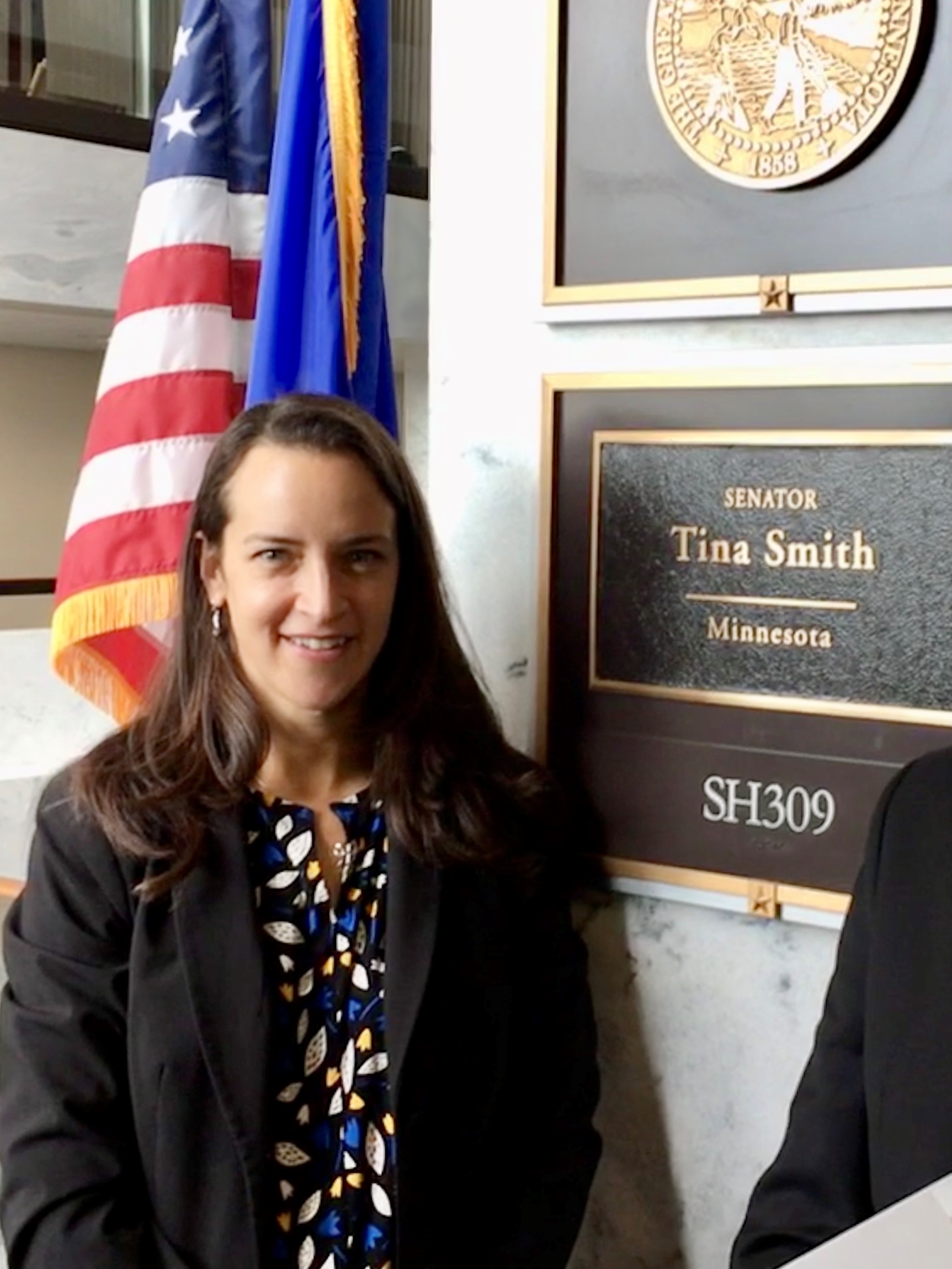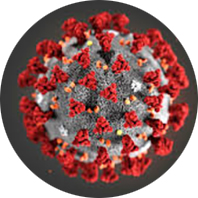
Spring 2021
Meet an AMP Advocate!
Linnea Baudhuin, PhD, is a Professor of Laboratory Medicine and Pathology at the Mayo Clinic in Rochester, Minnesota. In addition to being an AMP member, she has been a member of the Professional Relations Committee (PRC) since 2017. Dr. Baudhuin recently discussed the regulation of laboratory developed testing procedures (LDPs) during a virtual meeting with her Senator’s office, along with another AMP PRC member, Dr. David Viswanatha.
Image: Dr. Baudhuin pictured outside of Senator Tina Smith’s office when she visited Capitol Hill in 2018.
Was this your first time meeting with one of your representatives to advocate? If so, what did you think about the experience?
I have been fortunate to have previously visited Capitol Hill twice (in person!) in 2017 and 2018; both times to advocate for laboratory testing issues. During those visits, I was able to meet with multiple Representatives and their staff each day. I found these experiences to be exciting, enjoyable, eye-opening, and rewarding. My recent virtual meeting with AMP and the office of Senator Tina Smith (MN) was equally enjoyable and rewarding, and I am very appreciative of how prepared and supportive AMP was for this meeting in terms of sharing talking points, being well-versed on the issue, and guiding the conversation.
Did you enjoy meeting with the office in a virtual format? Would you look forward to participating in future virtual hill meetings?
The virtual format was a great experience. I really liked the efficiency of it, and it is just so easy to meet virtually rather than needing to travel to a location to meet. While meeting in-person on the Hill is a pretty amazing and unique experience unto itself, meeting virtually is a great option to have. I would definitely be open to participating in future virtual Hill meetings, and I would encourage anyone to take up this opportunity if it presents itself.
Through PRC you have spent a lot of time thinking about and advocating for molecular diagnostics. What do you derive from these volunteer experiences?
There are numerous policy, regulatory, and reimbursement issues facing laboratory medicine these days. Many times, proposed policies demonstrate a fundamental lack of understanding of the current regulatory framework and the substantial technical and clinical expertise that already exists in laboratory medicine. Therefore, I think it behooves all of us to advocate for our field, and to work with regulatory bodies to improve the field where improvements are needed, but to also try and educate policymakers so as not to overburden the field with unnecessary regulations which ultimately are to the detriment of patient care. In this regard, I am grateful to be a small part of this advocacy, to do what I can to help.
Do you have any advice for those who are new to AMP and want to get involved?
AMP is always looking for interested folks to get involved, and new people are usually needed every year as individuals roll off at the end of their committee terms. If there is a particular group or committee that someone is interested in, I would encourage them to reach out to the chair or another member of the committee to express interest. It seems that there are multiple different types of opportunities in AMP, and becoming involved is a great way to network and be exposed to unique experiences.
We invite AMP members interested in current policy issues to view the recent webinar AMP Advocacy in the Biden Administration and the 117th Congress: What to expect in 2021. Please contact us at policy@amp.org if you are interested in participating in future advocacy events!
AMP Remains Engaged on COVID-19 Pandemic Policies

As laboratories continue to respond to the COVID-19 pandemic in early 2021, AMP has been engaged in a number of clinical, educational and advocacy campaigns in order to help support our members:
American Rescue Plan includes robust funding for COVID-19 testing and genomic sequencing
On March 11th, President Biden signed the $1.9 trillion American Rescue Plan of 2021 into law, which includes $47.8 billion for testing and tracing activities, $1.75 billion for genomic sequencing and surveillance, and $500 million for the Centers for Disease Control and Prevention (CDC) data modernization and disease forecasting. The bill provides resources for COVID testing, recognizing it is a key component to a strategy for controlling the spread of SARS-CoV-2. The plan will work to fund the purchase of rapid tests, support the expansion of laboratory capacity, and support local governments and schools implementing testing programs. AMP will stay informed and distribute information about how laboratories can access some of this funding as we learn more.
The $1.75 billion for genomic sequencing and surveillance will provide critical funding for CDC’s Advanced Molecular Detection program, which will work to boost viral sequencing of SARS-CoV-2. The money will also help support public health infrastructure and expand existing public and private partnerships to assist in this work. Additionally, the White House devoted additional funds for testing and genomic sequencing of SARS-CoV-2 in mid-February to expand and improve access to COVID-19 testing including funding to increase testing in schools and underserved populations, increase domestic manufacturing in testing supplies and raw materials in short supply, as well as money for CDC for viral sequencing of positive SARS-CoV-2 samples to identify, track, and mitigate emerging strains.
Over the past year, AMP has been highly involved in advocating for the physicians and laboratory scientists who are on the front lines of SARS-CoV-2 diagnostic testing. While AMP plans to continue our advocacy on these issues, we are greatly encouraged to see that policymakers are taking positive steps to support the clinical laboratories that have responded to the pandemic. You can read more about AMP’s advocacy activities in the May 9th AMP blog post.
Molecular Testing for Cancer During the COVID-19 Pandemic
In February, AMP published the preliminary results of its “Molecular Testing for Cancer during COVID-19” survey of clinical laboratories. AMP’s ongoing series of COVID-19 surveys are administered to monitor, understand, and collect real-time data on laboratories' efforts and experiences during the COVID-19 pandemic response. The latest anonymous survey assessed how important aspects of molecular diagnostic testing for cancer, including testing volumes, laboratory operations, clinical trial testing, patient samples, and turnaround times, were affected by the COVID-19 pandemic. The preliminary results included feedback from 163 representatives from academic medical centers, commercial reference laboratories, and community hospitals in the US and around the world.
The results from this survey underscore the significant supply chain and staffing shortages that were reported in AMP’s April and August SARS-CoV-2 molecular testing surveys and show that they reverberate to molecular diagnostic testing for cancer. Addressing these issues during this pandemic and any future pandemics is necessary for laboratories to continue to operate at full capacity and ensure that patients can continue to receive timely testing. AMP is continuing to emphasize two of the previous recommendations:
- Reprioritize supply allocations based on clinical testing needs, which could change over time.
- Support the clinical laboratory workforce as they are essential to an effective medical and public health pandemic response.
On March 24th, Drs. Jill Murrell, Karen Weck and Eric Konnick met virtually with patient advocates to share the results of the survey. The virtual Lunch and Learn was a fantastic opportunity for AMP members and our valued patient advocacy partners to discuss the survey results, patients’ experiences with molecular diagnostic testing for cancer during the pandemic, and identify opportunities for AMP to work with the patient community to ensure continued access to molecular testing during and after the pandemic. This was the second virtual Lunch and Learn centered on testing during the COVID-19 pandemic and the PRC Patient Engagement subcommittee is looking forward to hosting a third event to discuss how the pandemic response has evolved over the past year.
AMP and CAP provide joint comments to a recent Local Coverage Determination from Novitas and First Coast on Respiratory Pathogen Testing
In February, AMP and CAP provided a joint comment letter on a recent draft coverage policy from Medicare Administrative Contractors Novitas and First Coast. AMP and CAP asked for clarification of language regarding administrative requirements listed in the LCD and provided a list of ICD-10 codes for consideration of inclusion within the final LCD. Moreover, AMP and CAP requested allowance for coverage of panels with more than five pathogens when they are determined to be clinically warranted. The letter detailed clinical scenarios when such testing is warranted. This letter was compiled with input from Infectious Disease Subdivision Leadership. The AMP Economic Affairs Committee thanks them for their assistance.
Ongoing Resources
To help AMP members stay up to date on the most recent advances in COVID-19 diagnostic testing, including regulatory and clinical practice announcements, AMP is constantly updating our “Testing Resources for COVID-19” webpage. We invite you all to peruse the materials and to share them with your colleagues.
Appropriate Reimbursement for Professional Analysis, Interpretation, and Reporting of Molecular Diagnostic Testing Procedures Needed
On March 16th, 2021, AMP released the results of our survey to assess the “Effort in Molecular Test Interpretation”. The survey both gathered data on the professional work that is performed to interpret a molecular diagnostic test result in the context of a patient’s history and assessed the work that is performed by MDs and qualified PhDs during molecular testing.
More than 100 molecular professionals from AMP and the American College of Medical Genetics and Genomics (ACMG) communities reported that their efforts spent on data analysis, interpretation, and reporting for molecular diagnostic tests were not sufficiently reimbursed. Respondents indicated that adequate reimbursement for these activities would improve patient care by increasing access to these essential medical services and enabling more data-driven treatment decisions.
Molecular diagnostic services are currently provided by both physicians and qualified doctoral scientists with specialized training and experience. The survey found that the extensive analysis, interpretation, and reporting requirements can often take more than six hours per test. However, that time, expertise, and professional effort are not adequately accounted for or reimbursed under existing payment systems.
Since 2011, AMP has been a leading advocate for appropriate reimbursement for qualified healthcare professionals who are providing high-quality molecular diagnostic services. The results of this assessment will be crucial in providing data to inform discussions with payers, federal agencies, and members of Congress. AMP will continue to actively work with many professional organizations as part of its ongoing commitment to informing and influencing public policies that ensure fair and reasonable reimbursement solutions.
Recent Comment Letters:
AMP Response to Accelerating Innovation in Diagnostic Testing for Lyme Disease RFI - March 15, 2021
AMP and CAP Response to Proposed Coverage Policy for Respiratory Pathogen Panel Testing DL38918 (First Coast) and DL38916 (Novitas) - February 24, 2021
Group Sign-on Letter Endorsing the Tracking COVID-19 Variants Act (Senate) - February 11, 2021
|
Group Sign-on Letter Endorsing the Tracking COVID-19 Variants Act (House) - February 11, 2021 AMP Response to the CMS Modernization Section of the Cures 2.0 Concept Paper - January 29, 2021 AMP Reconsideration Request to CMS for CLFS Final Determinations - January 20, 2021 |
The AMP EAC and PRC work diligently to provide input to Congress and relevant agencies on all issues affecting regulation and reimbursement of molecular procedures. You can peruse all recent comment letters here.

















